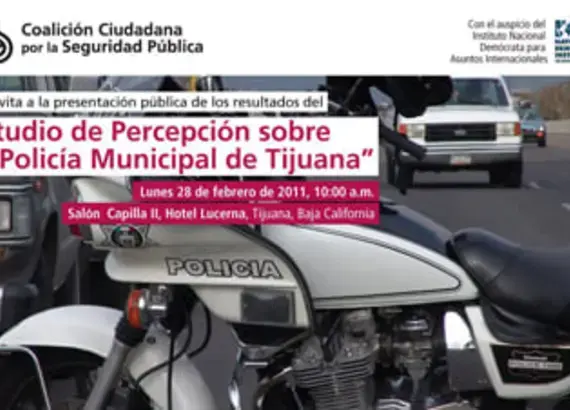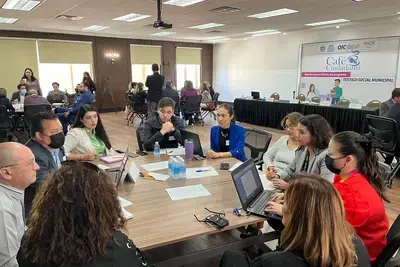
Success Story
Tijuana Civic Groups Use Opinion Research to Strengthen Police Reform Proposal
During his most recent visit to Washington, D.C., Mexican President Felipe Calderon said that Mexico is “undergoing a profound transformation, built on the principles and values of democracy.” Among these principles and values, he underscored the importance of “an active civil society that not only exercises its rights and freedoms, but also holds the authorities to account.”
In that spirit, a coalition of civil society organizations in Tijuana, the Citizen Coalition for Public Security (Coalición Ciudadana por la Seguridad Pública, CCSP), has developed a proposal it hopes will move city government to bolster an anti-corruption campaign that has led to the detention and investigation of a number of municipal policemen for alleged ties to organized crime.
These arrests came as the result of a systematic vetting designed to root out corrupt members of the local police force. The coalition is calling for greater job security, improved benefits and better pay for local police, which it believes will act as a deterrent to corruption and undergird the gains made by the vetting process.
To strengthen their proposal, the CCSP — with NDI support — commissioned a study, released last month, which shows that while members of the community believe security improvements have been made in Tijuana, their perception of municipal police is still largely negative. Specifically, the opinion research showed that the public believes the police would benefit from additional training, equipment and benefits.
Julian Quibell, the director of NDI’s programs in Mexico, noted that the country’s civic groups rarely have hard numbers like these to support their requests to elected officials and more often approach them with anecdotal evidence or isolated personal experiences.
“The information in the study reinforced the CCSP’s arguments and helped them get the attention of local government leaders and other potential allies for their cause,” Quibell said. “Having access to this information on public perceptions allowed the CCSP to present specific policy proposals backed up by data.”
The study was conducted by FOCUS Investigación de Mercados, an independent opinion research firm, with a random sample of 600 Tijuana residents, providing a 95 percent statistical accuracy rate at a margin of plus or minus 4 percentage points. FOCUS also interviewed 11 opinion leaders, including academics, journalists and civic leaders.
The results revealed that 41.7 percent of citizens believe the level of security in the city has improved over the past year, and 70 percent of opinion leaders agreed. However, 58.8 percent of the study’s participants, and 90 percent of the opinion leaders, said there is a need for a greater police presence.
The opinion leaders declared that municipal police officers have improved their coordination with the military, and it is apparent that they are less involved with organized crime. But, they said, overall, the police force has not made any noteworthy improvements.
Continued corruption and extortions have tarnished their image, and citizens fear rather than respect the police. Nearly seven out of 10 citizens surveyed declared that they had a low level of trust in police officers; only three out of 10 said their trust had increased.
Poll participants and opinion leaders agreed that every new police officer should be required to have a clean background, be well trained, have proven trustworthiness, and be required to demonstrate a minimum level of formal education and physical condition, among other prerequisites. The poll showed that 49.2 percent of citizens and 54.5 percent of opinion leaders believe police officers are not adequately trained.
Additionally, citizens and opinion leaders agreed that to help curb corruption, municipal police officers should be well compensated. Both groups said that providing local police with basic benefits such as life insurance, social security and a retirement fund would all be adequate incentives.
NDI helped CCSP research and come to a consensus on the policy changes it would present as well as develop an advocacy plan using traditional media, social networks and other resources to amplify its voice and gain support for its proposal.
CCSP — a coalition made up of the Civic Alliance, CETYS University Tijuana campus, Iberoamerican University, AIDS Healthcare Foundation, the Council of Citizen Participation of the PGR, and Reacciona Tijuana — was established in 2010.
In preparation for local elections last July, NDI brought together a diverse group of NGOs to interview mayoral candidates and discuss their platforms and policy preferences regarding public security. The forums, or “encuentros con candidatos,” helped the NGOs identify common areas of concern where they could work together and maximize dialogue between the group and the candidates.
Related:
Pictured above:CCSP advertisement for study release
Published March 17, 2011



